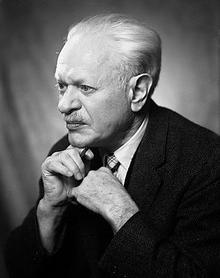
Back كينيث بيرك Arabic كينيث بيرك ARZ Кенет Бърк Bulgarian Kenneth Burke German Kenneth Burke Spanish Kenneth Burke Estonian کنت بورک Persian Kenneth Burke Finnish Kenneth Burke French Kenneth Burke Galician
Kenneth Burke | |
|---|---|
 | |
| Born | Kenneth Duva Burke May 5, 1897 Pittsburgh, Pennsylvania, U.S. |
| Died | November 19, 1993 (aged 96) Andover, New Jersey, U.S. |
| Occupation(s) | Literary theorist and philosopher |
| Institutions | University of Chicago |
Kenneth Duva Burke (May 5, 1897 – November 19, 1993) was an American literary theorist, as well as poet, essayist, and novelist, who wrote on 20th-century philosophy, aesthetics, criticism, and rhetorical theory.[1] As a literary theorist, Burke was best known for his analyses based on the nature of knowledge. Further, he was one of the first individuals to stray from more traditional rhetoric and view literature as "symbolic action."
Burke was unorthodox, concerning himself not only with literary texts, but also with the elements of the text that interacted with the audience: social, historical, political background, author biography, etc.[2]
For his career, Burke has been praised by The Johns Hopkins Guide to Literary Theory and Criticism as "one of the most unorthodox, challenging, theoretically sophisticated American-born literary critics of the twentieth century." His work continues to be discussed by rhetoricians and philosophers.[3]